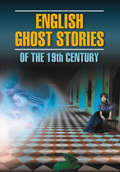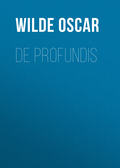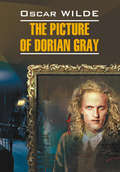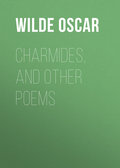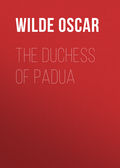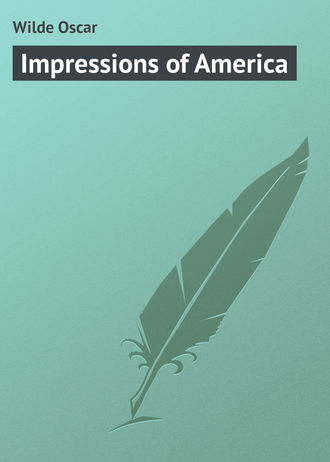
Оскар Уайльд
Impressions of America
As regards poetry he expressed his opinion that Poe was the greatest American poet, and that Walt Whitman, if not a poet, was a man who sounded a strong note, perhaps neither prose nor poetry, but something of his own that was “grand, original and unique.”
During his tour in America Wilde “happened to find” himself (as he has himself described it), in Louisville, Kentucky. The subject he had selected to speak on was the Mission of Art in the Nineteenth Century. In the course of his lecture he had occasion to quote Keats’ Sonnet on Blue “as an example of the poet’s delicate sense of colour-harmonies.” After the lecture there came round to see him “a lady of middle age, with a sweet gentle manner and most musical voice,” who introduced herself as Mrs. Speed, the daughter of George Keats, and she invited the lecturer to come and examine the Keats manuscripts in her possession.
Some months afterwards when lecturing in California he received a letter from this lady asking him to accept the original manuscript of the sonnet which he had quoted.
Mention must be made of Wilde’s first play, a drama in blank verse entitled “Vera, or the Nihilists.” It had been arranged that, before his departure for America, this play should be performed at the Adelphi Theatre, London, with Mrs. Bernard Beere as the heroine, on Saturday, December 17th, 1881, but a few weeks before the date fixed for the first performance, the author decided to postpone the production “owing to the state of political feeling in England.”
On his return to England in 1883 Wilde started on a lecturing tour, the first being to the Art Students of the Royal Academy at their Club in Golden Square on June 30th. Ten days later he spoke at Prince’s Hall on his “Personal Impressions of America,” and on subsequent occasions at Margate, Ramsgate and Southampton. On Monday, July 30th he lectured at Southport and on the following Thursday he went to Liverpool to welcome Mrs. Langtry on her return from America, and the same afternoon he left on his second visit to the States in order to superintend the rehearsals of “Vera,” which it had been arranged to produce at the Union Square Theatre, New York, on August 20th following. The piece was not a success – it was, indeed, the only failure Wilde had. However, his next play, which he called his “Opus Secundum,” also a blank verse tragedy, had a successful run in America in 1891. This was “The Duchess of Padua,” played by Lawrence Barrett, under the title of “Guido Ferranti.” This has not been seen in England, nor is it even possible for Wilde’s admirers to read this early offspring of his pen, for only twenty copies were printed for acting purposes in America and of these but one is known to be in existence, in this country at least.
An authorised German translation was made by Max Meyerfeld and the first performance took place at the German Theatre in Hamburg about a year ago. An English version is advertised from a piratical publisher in Paris but it is only a translation from the German back into English.
Towards the end of September 1883 Oscar Wilde returned to England and immediately began “an all round lecturing tour,” his first visit being to Wandsworth Town Hall on Monday, September 24th, when he delivered to an enthusiastic audience a lecture on his “Impressions of America,” which is contained in the following pages. He was dressed, a London paper of the time states, “in ordinary evening costume, and carried an orange-coloured silk handkerchief in his breast. He spoke with great fluency, in a voice now and then singularly musical, and only once or twice made a scarcely perceptible reference to notes.” The lecture was under the auspices of a local Literary Society, and the principle residents of the district turned out “en masse.” The Chairman, the Rev. John Park, in introducing the lecturer, said there were two reasons why he was glad to welcome him, and he thought his own feelings would be shared by the audience. They must all plead guilty to a feeling of curiosity, he hoped a laudable one, to see and hear Mr. Wilde for his own sake, and they were also glad to hear about America – a country which many might regard as a kind of Elysium.
On March 5th in the following year Wilde lectured at the Crystal Palace on his American experiences, and on April 26th he “preached his Gospel in the East-end,” when it is recorded that his audience was not only delighted with his humour, but was “surprised at the excellent good sense he talked.” His subject was a plea in favour of “art for schools,” and many of his remarks about the English system of elementary education – with its insistence on “the population of places that no one ever wants to go to,” and its “familiarity with the lives of persons who probably never existed” – were said to be quite worthy of Ruskin. A contemporary account adds that Wilde “showed himself a pupil of Mr. Ruskin’s, too, in insisting on the importance of every child being taught some handicraft, and in looking forward to the time when a boy would rather look at a bird or even draw it than throw “his customary stone!”



